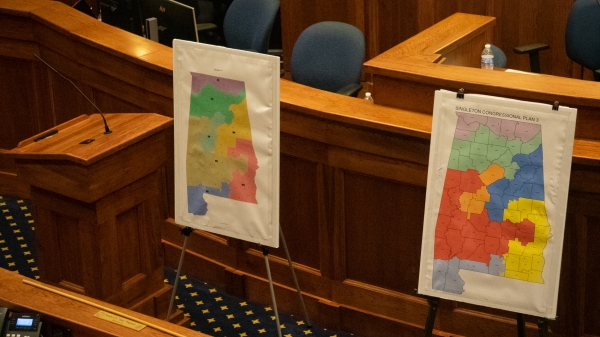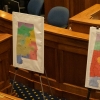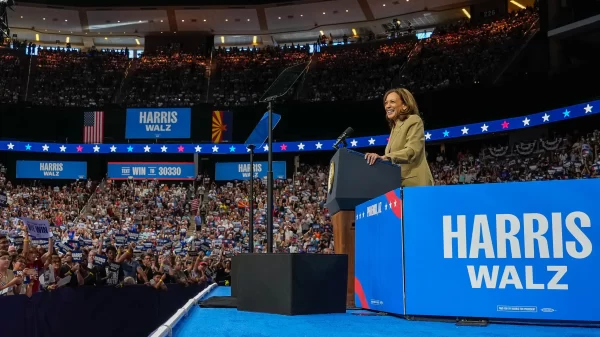|
Getting your Trinity Audio player ready...
|
The Chair of Alabama’s Legislative Black Caucus and several other organizations and individuals issued statements in response to a federal court’s decision Tuesday, rejecting Alabama’s 2023 congressional map after it was redrawn without including two majority Black districts that would remedy violations of the Voting Rights Act of 1965.
Sen. Merika Coleman, D-Pleasant Grove, and Chair of the Black Caucus made the following statement:
“The decision today represents what we in this state already knew to be true, that the Republican-led Legislature is unable to draw maps that offer black voters a chance to fairly elect representation of their choice consistent with federal laws. Alabama has a long history of voting rights struggles and victories, and we are so thankful that the panel of federal judges ruled correctly on this issue and will appoint a special master to ensure that the 2024 Congressional elections finally offer an equitable chance for black voters to have their voices heard. However, we must highlight how disappointed we are that our Republican colleagues in the Legislature have repeatedly defied both federal law and Supreme Court orders in their attempts to diminish the voting power of African Americans in Alabama, and hope they will make more substantive efforts to incorporate all voices into the redistricting process in the future.”
The same district court that ruled Tuesday to reject the new Alabama congressional maps originally ruled that Alabama’s previous map violated the VRA and ordered the state to draw two majority minority districts or “something close to it.” In June following an appeal to the U.S. Supreme Court by Alabama the highest court in the land also sided with the district court in Allen v. Milligan that Alabama’s previous map violated the VRA and diluted Black voting power.
Alabama entered into a special session in July to redraw the maps but instead of following the orders of both courts high ranking Alabama GOP officials devised a plan to get a case back before the Supreme Court in hopes of challenging and gutting Section 2 of the VRA. The federal court’s rejection of the map Tuesday is all according to plan.
Also, the court has ordered a special master to re-draw the map which will also cost Alabama’s taxpayers.
Evan Milligan, the lead plaintiff in Allen v. Milligan and executive director of Alabama Forward, stated that the fight was not over to ensure fair voting maps.
“We’re thankful that the federal court heard our argument,” Milligan said. “We are thankful to the many people who also heard our argument and showed their support by filling the federal courtroom and even the overflow room a few weeks ago. Prior to that hearing, we had hoped our state legislature and governor would have heard us as well. Had they listened to the Supreme Court, we could have saved our state some money and avoided this Groundhogs’s Day loop that some in our state want us to remain trapped within. Nevertheless, we know that fair maps provide a way out of this trap. And we will do every decent thing in our power to ensure that our state produces district maps that comply with the Voting Rights Act our elders fought and died to realize for us. Amen and onward.”
JaTaune Bosby-Gilchrist, executive director of ACLU Alabama, emphasized how Alabama lawmakers deliberately disobeyed court orders twice.
“Twice, Alabama lawmakers have been asked to draw fair congressional districts that give Black Alabamians the opportunity to elect a candidate of their choice,” said JaTaune Bosby-Gilchrist, executive director of ACLU Alabama. “ And twice, a panel of federal judges have found that Alabama lawmakers failed to do so. Elected officials ignored their responsibilities and chose to violate our democracy. We hope the court’s special master helps steward a process that ensures a fair map that Black Alabamians and our state deserve.”
Anneshia Hardy, executive director of Alabama Values, also commented stating, “The court’s decision to strike down the state’s unfair and discriminatory congressional map for the second time underscores the urgency and necessity for organizers, advocates, and community members to continue to demand fair and equitable representation. While we share in the collective relief and hope that springs from this ruling, our focus remains on the journey ahead. The fight for fair representation is far from over, and Alabama Values remains diligent in ensuring that the redrawing process is transparent, inclusive, and truly reflective of our state’s diverse population. We deeply appreciate the ongoing support and engagement from Alabamians across the state, and we will continue to champion the cause for fair maps. This isn’t just about lines on a map; it’s about the rights, voices, and futures of Alabamians.”
On Oct. 3 a hearing will be held on the map plans to be created by the special master at Hugo L. Black Courthouse in Birmingham.


















































